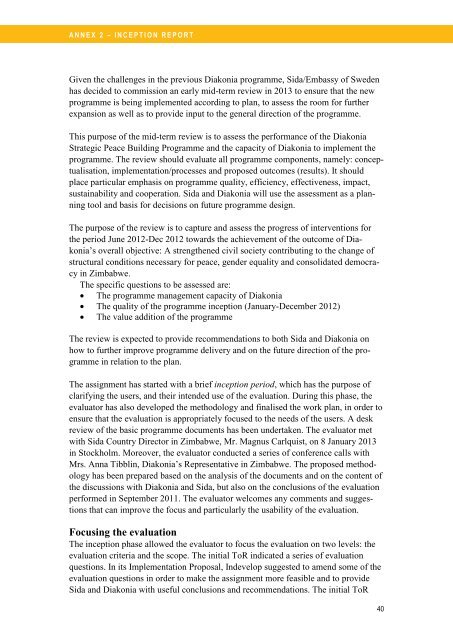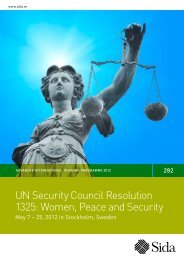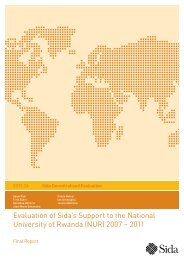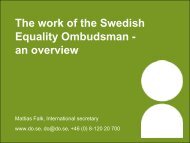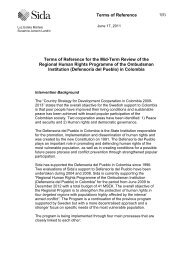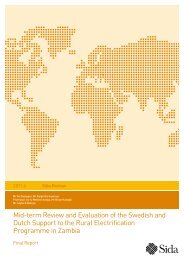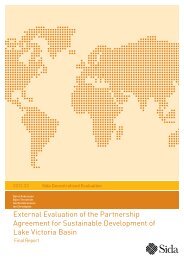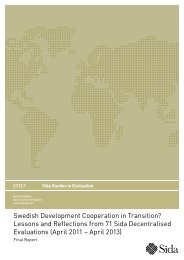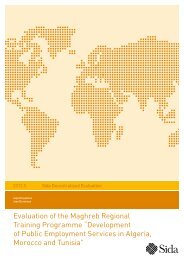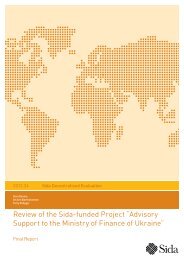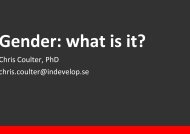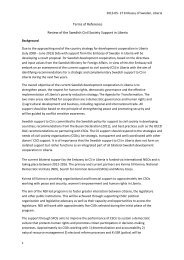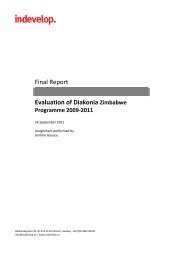Mid-term Review of the Diakonia Strategic Peace Building ... - Sida
Mid-term Review of the Diakonia Strategic Peace Building ... - Sida
Mid-term Review of the Diakonia Strategic Peace Building ... - Sida
You also want an ePaper? Increase the reach of your titles
YUMPU automatically turns print PDFs into web optimized ePapers that Google loves.
A N N E X 2 – I N C E P T I O N R E P O R T<br />
Given <strong>the</strong> challenges in <strong>the</strong> previous <strong>Diakonia</strong> programme, <strong>Sida</strong>/Embassy <strong>of</strong> Sweden<br />
has decided to commission an early mid-<strong>term</strong> review in 2013 to ensure that <strong>the</strong> new<br />
programme is being implemented according to plan, to assess <strong>the</strong> room for fur<strong>the</strong>r<br />
expansion as well as to provide input to <strong>the</strong> general direction <strong>of</strong> <strong>the</strong> programme.<br />
This purpose <strong>of</strong> <strong>the</strong> mid-<strong>term</strong> review is to assess <strong>the</strong> performance <strong>of</strong> <strong>the</strong> <strong>Diakonia</strong><br />
<strong>Strategic</strong> <strong>Peace</strong> <strong>Building</strong> Programme and <strong>the</strong> capacity <strong>of</strong> <strong>Diakonia</strong> to implement <strong>the</strong><br />
programme. The review should evaluate all programme components, namely: conceptualisation,<br />
implementation/processes and proposed outcomes (results). It should<br />
place particular emphasis on programme quality, efficiency, effectiveness, impact,<br />
sustainability and cooperation. <strong>Sida</strong> and <strong>Diakonia</strong> will use <strong>the</strong> assessment as a planning<br />
tool and basis for decisions on future programme design.<br />
The purpose <strong>of</strong> <strong>the</strong> review is to capture and assess <strong>the</strong> progress <strong>of</strong> interventions for<br />
<strong>the</strong> period June 2012-Dec 2012 towards <strong>the</strong> achievement <strong>of</strong> <strong>the</strong> outcome <strong>of</strong> <strong>Diakonia</strong>’s<br />
overall objective: A streng<strong>the</strong>ned civil society contributing to <strong>the</strong> change <strong>of</strong><br />
structural conditions necessary for peace, gender equality and consolidated democracy<br />
in Zimbabwe.<br />
The specific questions to be assessed are:<br />
The programme management capacity <strong>of</strong> <strong>Diakonia</strong><br />
The quality <strong>of</strong> <strong>the</strong> programme inception (January-December 2012)<br />
The value addition <strong>of</strong> <strong>the</strong> programme<br />
The review is expected to provide recommendations to both <strong>Sida</strong> and <strong>Diakonia</strong> on<br />
how to fur<strong>the</strong>r improve programme delivery and on <strong>the</strong> future direction <strong>of</strong> <strong>the</strong> programme<br />
in relation to <strong>the</strong> plan.<br />
The assignment has started with a brief inception period, which has <strong>the</strong> purpose <strong>of</strong><br />
clarifying <strong>the</strong> users, and <strong>the</strong>ir intended use <strong>of</strong> <strong>the</strong> evaluation. During this phase, <strong>the</strong><br />
evaluator has also developed <strong>the</strong> methodology and finalised <strong>the</strong> work plan, in order to<br />
ensure that <strong>the</strong> evaluation is appropriately focused to <strong>the</strong> needs <strong>of</strong> <strong>the</strong> users. A desk<br />
review <strong>of</strong> <strong>the</strong> basic programme documents has been undertaken. The evaluator met<br />
with <strong>Sida</strong> Country Director in Zimbabwe, Mr. Magnus Carlquist, on 8 January 2013<br />
in Stockholm. Moreover, <strong>the</strong> evaluator conducted a series <strong>of</strong> conference calls with<br />
Mrs. Anna Tibblin, <strong>Diakonia</strong>’s Representative in Zimbabwe. The proposed methodology<br />
has been prepared based on <strong>the</strong> analysis <strong>of</strong> <strong>the</strong> documents and on <strong>the</strong> content <strong>of</strong><br />
<strong>the</strong> discussions with <strong>Diakonia</strong> and <strong>Sida</strong>, but also on <strong>the</strong> conclusions <strong>of</strong> <strong>the</strong> evaluation<br />
performed in September 2011. The evaluator welcomes any comments and suggestions<br />
that can improve <strong>the</strong> focus and particularly <strong>the</strong> usability <strong>of</strong> <strong>the</strong> evaluation.<br />
Focusing <strong>the</strong> evaluation<br />
The inception phase allowed <strong>the</strong> evaluator to focus <strong>the</strong> evaluation on two levels: <strong>the</strong><br />
evaluation criteria and <strong>the</strong> scope. The initial ToR indicated a series <strong>of</strong> evaluation<br />
questions. In its Implementation Proposal, Indevelop suggested to amend some <strong>of</strong> <strong>the</strong><br />
evaluation questions in order to make <strong>the</strong> assignment more feasible and to provide<br />
<strong>Sida</strong> and <strong>Diakonia</strong> with useful conclusions and recommendations. The initial ToR<br />
40


